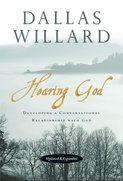 This is the first in what I hope will become a series of engagements of important voices in our time. I want to show that their proposals echo or accord with covenant epistemology—that covenant epistemology makes sense of their endeavors, visions, messages. This is not an “I told you so.” It is a “Behold! See the common thread, the shared understanding and hope of many in our time.” May covenant epistemology lend resourceful aid to a vision larger than itself even as it draws gratefully on the resources of others in dynamic conversation. –elm In the high summer of 2014, my mornings were streaked rosy gold with my reading of Dallas Willard’s Hearing God: Developing a Conversational Relationship with God (IVP, 1984, updated and expanded edition 2012). Willard (1935-2013), a noted philosopher of phenomenological realism, is perhaps better known as a powerful writer of helpful books on Christian spirituality. This was my first venture into Willard’s work—one I had anticipated with delight for a long time. Plus, I was intrigued because I had heard third-hand of Willard’s personal commendation of covenant epistemology. Summarizing Hearing God The book addresses the ever-live concern of whether people can/do hear God speak to them, to give them specific guidance about his will for their lives. Willard argues that the way we are meant to hear God is within the larger context of growing a conversational relationship with God. And this is only possible when we have reoriented our general understanding of reality so that spiritual life is real, and persons in relationship, shaping reality by words, is the way reality is. Willard gently guides his readers through this reorientation, and he shares the concrete know-how of an expert and experienced guide. I commend this nourishing book to any Christian believer wanting to deepen their relationship with God. Willard writes: “The key concept underlying all the themes I have raised in this book is this: Hearing God’s word will never make sense except when it is set within a larger life of a certain kind.” (274) Echoes of Covenant Epistemology in Hearing God In several respects, the heart of what Dallas Willard is carrying out, and of what he is commending, accords with the claims of covenant epistemology. Covenant epistemology claims that all knowing is relational knowing, and the better we are at cultivating the knowing as an interpersonal relationship, the better we will be at knowing. This is true of knowing rose bushes or carpentry. It’s obviously true of knowing persons, though we always seem to need to be reminded to treat persons as persons. Covenant epistemology also means we should see knowing persons and knowing rosebushes as working the same way, in many respects—interpersonally. It takes challenging the presumed distinction between knowing rose bushes and knowing persons to make us better at both. Knowing God, of course, is knowing a person of the most unique sort. Hearing God, obviously, is about knowing God. Willard is showing us how to cultivate a mature interpersonal relationship with God. And what he offers and how he offers it are just the key points of covenant epistemology.
I'll develop these points in Part II coming later this month.
2 Comments
|
Details
AuthorEsther Lightcap Meek Archives
September 2015
Categories
All
|
 RSS Feed
RSS Feed